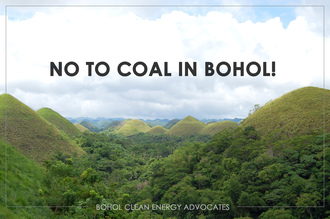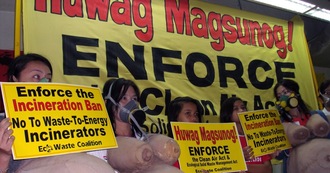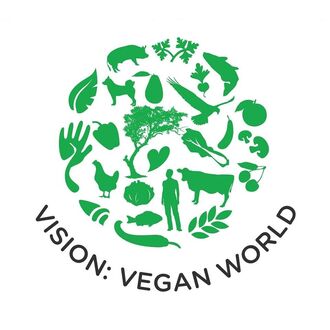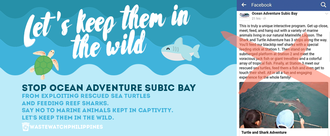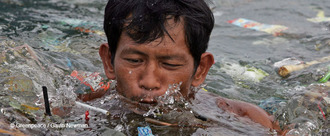-
No to Coal in BoholAlarmed that there are sectors in the Provincial Government along with investors and power providers who are poised to endorse a backward idea of a coal-fired power plant in the island, we demand that our leaders to lead us in achieving Bohol’s Goals that include, among others, Environmental Protection and Management; and, Responsive, transparent and accountable governance. Drawing from our earlier manifesto, we echo the call, this time, taking a firm stand against whatever plans and machinations there might be to utilize coal in generating power within our province. We have united behind the following arguments: 1. THAT COAL IS DIRTY AND DEADLY. Coal damages both people and planet. Existing and proposed coal power plants in the Philippines can cause up to 2,410 premature deaths annually according to a 2015 Harvard study. Coal burning emits substances which contribute to smog, haze, lung disease, and respiratory illnesses; as well as neurological and developmental damage in humans and other animals (US Energy Information Administration, 2017). Coal mining contributes to soil erosion, water pollution and loss of biodiversity. It is directly linked with climate change as it is responsible for 46% of carbon dioxide emissions worldwide, inducing natural disasters. 2. THAT COAL IS COSTLY. While there is still a popular perception that coal is sold cheaply, a research by the International Institute for Sustainable Development (IISD) revealed that coal use actually brings with it additional costs that are not traditionally taken into account such as: (1) Subsidies to coal producers; (2) Air pollution estimated to cause more than 6,000 global deaths annually; and, (3) Greenhouse Gas emissions that undermine targets under the Paris Agreement on Climate. If we monetize these impacts the total cost of coal is estimated to be around USD 11 cents per kilowatt hour (kWh), more than double the cost of competing renewable energy based on recent renewable auction results. 3. THAT GLOBALLY COAL IS NO LONGER A VIABLE OPTION. The recent falls in solar Photo Voltaic prices have led India to cancel new coal capacity, in addition to rising concern about the impacts of coal use on air pollution. In China, this concern led to a moratorium on new coal plants in 28 out of 31 provinces. With the tide turning against coal across the world, there is real concern that investments made today could soon be impossible to operate on environmental, public health and cost grounds, leaving a legacy of stranded power stations as the last monuments to the age of coal. (IISD, 2017) WE REJECT the proposal or plan of private or government investors in establishing a coal-power plant in the province of Bohol because it is tantamount to a violation of the existing laws and commitment for the Boholano people; WE DECLARE that renewable energy is the way forward. A 2013 World Wide Fund for Nature (WWF) report said that in 2011, at least 384 renewable energy service contracts were awaiting approval from the Department of Energy, equalling to 6,046 MW of generation capacity. Currently, there are 13 operational coal-fired power plants with a combined installed capacity of 4.937 MW; WE STRONGLY SUPPORT the development of renewable energy sources as the way forward for our beloved Bohol that claims to have ecological and cultural tourism as its main path for sustainable development being one of its primary economic drivers. WE ENJOIN our fellow Boholanos and residents to join us in this worthy cause to save our environment from this threat of destruction for our sake and the future generation. WE DEMAND as citizens and voters that the Sanggunian Panlungsod of Tagbilaran City and the Sangguniang Panlalawigan of Bohol shall recognize the negative impact of coal-based power generation and the need to shift to renewable energy sources by passing Resolutions to support calls for “a moratorium on the establishment of carbon-intensive and fossil-based technologies”; and interpose its objection on any proposed coal-fired project within our province; WE ALSO URGE on the Office of the Secretary of the Department of Environment and Natural Resources and the Office of the Secretary of the Department of Energy to deny any applications for coal-fired and other fossil-based power plants within Bohol; and implement the mandate for the development and use of renewable, sustainable energy sources and technologies.863 of 1,000 SignaturesCreated by Liza Macalandag
-
#SaveSAIDMC-SAID is an institution dedicated to the total development of deaf children, providing for equal opportunities for learning. It was founded in 1974 and completely integrated in Miriam College system in 2007. MC-SAID is an important part of the community as it is the only school in the Philippines with complete continuum education from basic to graduate studies for deaf children. It is important as it nurtures them to develop emotional, social and cognitive abilities that are crucial towards their drive for self-actualization and community. The plans to close MC-SAID by 2019 is due to low number of enrollees and seeming lack of funds to sustain operations. Parents are only given a year to look for an alternative school that can cater to the special needs of their children. The abrupt decision to close MC-SAID is prioritizing who gets access to education. It means one is less valuable than the other. It means leaving people behind. We, concerned individuals and alumni of Miriam College, are appealing to the Board of Trustees of Miriam College to reconsider their plans of closing Miriam College - Southeast Asian Institute for the Deaf (MC-SAID) by the end of school year 2018-2019. We further appeal to the Board of Trustees to rethink this closure by extending MC-SAID's operations beyond 2019 and creatively exploring more viable alternatives that will be mutually beneficial for the school and its students. Miriam College should give itself considerable amount of time to find innovative solutions to their existing challenges, looking for better alternative rather than full closure of MC-SAID. Miriam College have been expanding other areas of their academic community. It is within their scope to do the same for MC-SAID. Similarly, they should also provide adequate time for parents and students to consider all possible options for their children. The essence of having a special school for deaf children is that they require special attention. Miriam College should involve them in exploring for more acceptable and reasonable solutions, rather than passive recipients of unfair decisions. The future of the children is at stake, which makes them the biggest stakeholders to the issue. Miriam College is an institution that “commits itself to creating and living within our school community the very changes we seek to realize in society”. One of their core values, Justice, espouses rejection of discrimination of any kind against any individual or any group. We hope Miriam College will stand true to its mission, vision and core values by continuously providing equal opportunities of learning for deaf children. #SaveSAID5,400 of 6,000 SignaturesCreated by Joan Meris
-
Uphold the Philippine Ban on Waste IncinerationIncineration, including so-called "waste-to-energy" (WTE) incineration facilities (i.e. burning waste to produce electricity), is neither a good way to manage waste nor to produce electricity. In fact, it is proven to be the most expensive, most polluting, most energy intensive and most inefficient way to manage waste and generate electricity: 1. Incineration is a major source of cancerous dioxins and furans, which are regulated under an international treaty, the Stockholm Convention on Persistent Organic Pollutants; and 2. It is also the most expensive way to produce electricity--WTE facilities cost more to construct and operate than coal or nuclear plants. But the government--through Congress and the Department of Environment and Natural Resources (DENR)--are aggressively promoting WTE incineration thinking it will magically solve the country's waste problems. House Bill 2286 seeks to repeal the incineration ban in the Philippine Clean Air Act (RA 8749) and amend the Ecological Solid Waste Management Act (RA 9003) in order to allow the entry of WTE incineration technologies in the Philippines. And the DENR is even paving the way for waste incineration, instead of of doing their duty to protect the environment. The Clean Air Act guarantees every Filipino’s right to breathe clean air and right to a healthy environment. The ban on incineration supports this. Waste incineration aside from being a major source of cancer-causing emissions, also produces particulate matter, which is identified as a leading cause of premature deaths. The bill also undermines the country’s landmark waste law, RA 9003, which calls for an ecological approach to waste management. Incinerators, and WTE incineration facilities threaten human health, pollute our air, land and water, harm our economies, contribute significantly to global warming, and fuel an unsustainable system of consumption and wasting. They have no place in an ecological waste management system, and in today's emerging circular economy. Congress and the DENR must realize that incineration is not a feasible waste treatment option. Instead, they must work toward real solutions and adopt the Zero Waste approach to waste and resource management. This can start with the strict implementation of RA 9003 which does not only save money, but also creates jobs, improves public health and mitigates climate change.139 of 200 SignaturesCreated by No Burn Pilipinas Alliance
-
Peoples Petition for Sustainable and Ecological Food System in the Philippines.We are experiencing a food emergency with hunger in the Philippines categorized as a “serious problem” in the 2015 Global Hunger Index. In the past 15 years (1999-2014), the number of Filipino families who rated themselves as hungry rose from 8.3% to 18.3% based on the Social Weather Station’s (SWS) self-rated hunger survey. The SWS survey also revealed that 13.4% of families suffer from involuntary hunger in 2015. The victims of hunger are mainly children and women with where 20% of children below 5 years old are underweight, 30% are underheight, and 8% are wasted; while 31% of adults 20 years old and above are overweight or obese mainly due to increasing consumption of unhealthy food. There is minimal support for building on-farm biodiversity and promoting access to diverse diets to address nutrition security and build farm resilience against the impacts of climate change. Our farms, especially those under industrial production, depletes our soils and poisons our water and air with extensive use of chemical fertilizers and pesticides. Ironically endangering the very environment that supports food production. Our trade rules and incentive measures favor more corporate food production, whereas more than 80% of our food is still produced by small holder Filipino farmers, who remain poor, hungry and malnourished. While the Philippine Constitution and laws is replete with provisions on food security, there is an urgent need for greater coherence, convergence and synergy on the various programs of government on food which are presently governed under different departments and agencies. Our Constitution explicitly statesd that the State shall defend the right of children to assistance, including proper care and nutrition. We have yet to realize this Constitutional rights owing to a lack of policy framework that advances the right of peoples to healthy and culturally appropriate food produced through ecologically sound and sustainable methods, and the Filipinos’ right to define our own food and agriculture systems. The essence of food security and sovereignty is the total and full development of every Filipino living a life with dignity. Join us! Together, let us advance as sustainable/ecological food system for all Filipinos.208 of 300 SignaturesCreated by Peoples Food Movement
-
Make Parrotfish fishing illegal and all coral reef fishOverfishing will wipe out 59 reef fish species. A study shows that some of the largest fish that swam in the coral reefs around the Philippines have all but disappeared following decades of unsustinable fishing. That includes iconic and valuable species such as the green bumphead parrotfish, the humphead wrasse, the African pompano, thw giabt grouper, and the mangroove red snapper. Fishermen must understand that over fishing reef fish will affect not only most species but our corals health, specially if we lost another parrotfish species.566 of 600 SignaturesCreated by Amira Khair
-
Stop Legazpi City Flying Lantern Release1. What goes up must come down, and farmers in particular have become increasingly concerned that livestock might swallow a lantern's wire or bamboo frame, or, even worse, that fires might break out in hay barns. Elsewhere, coastguards say lanterns, which can travel for several kilometres and to an altitude of 1,000m before the candle burns out, are routinely mistaken for distress flares. A handful of east Asian countries, such as Vietnam, Malaysia and Thailand, have already introduced bans, particularly in the lead up to major festivals. (https://www.theguardian.com/environment/2010/feb/02/sky-lanterns-danger-farm-animals) 2. Countries like Argentina, Austria, Australia, Brazil, Chile, Colombia, Costa Rica, New Zealand, Spain, Germany, and parts of Canada and the USA have actually already banned the release of sky lanterns. (http://www.wheninmanila.com/why-we-should-not-release-balloons-skylanterns/). 3. However, the worst part of the fallout from the activity is the impact on local fauna. Reports of animals dying painfully, typically strangled by old lanterns' wires or suffocated by undecomposed paper, are frequent during this time of year. Some visitors are no doubt already aware of this, particularly following the high-profile death of an owl in the U.K. a few years ago. The bird was found suffocated and partly burnt inside the remains of a lantern... Humans are also at risk. The light emitted by lanterns sent en masse at night has been proven to be disruptive to aircraft pilots. As such, some countries like Malaysia have banned the use of sky lanterns in and around certain cities in order to prevent fatal accidents. (http://www.chinapost.com.tw/editorial/taiwan-issues/2017/02/10/491229/pingxis-sky.htm) 4. Though they are undoubtedly beautiful, even the biodegradable lanterns can be incredibly harmful to both the environment and wildlife. Sky lantern litter takes quite some time to decompose, and the wire frames have been known to strangle and maim wild animals and livestock. They also pose a significant fire hazard. Not only have they caused multiple wildfires, a sky lantern was also responsible for a massive fire at the Smethwick Recycling Plant in West Midlands, England. (http://earth911.com/living-well-being/events-entertainement/environmental-impact-traditions/) 5. With Save Philippine Seas, know more about the ills and harms of sky lantern releases here: https://www.facebook.com/pg/savephilippineseas/photos/?tab=album&album_id=1318238384932367787 of 800 SignaturesCreated by Rodne Galicha
-
Everybody has a Right to Compassionate, Plant-based/Vegan Food, Give us Access to it!There is a growing number of people all over the world, and in the Philippines who are shifting to a vegan diet and lifestyle. It is a conscious choice to show love and respect for animals and Mother Earth, and to care for one's own health and well-being. People like these should not be marginalized by having practically nothing to choose from in school, office, and hospital canteens, restaurants, hotels, and other food establishments. There are a number of vegan groups on Facebook in the Philippines, such as Vegan Philippines, Manila Vegans, Vegans of Manila, among many others. These are proof that there is a growing interest in a vegan diet in the country. The members of these groups are vegans, transitioning, or vegan-curious. Aside from the people who are in vegan groups, there are countless others who prefer healthier, more ethical, and more environment-friendly food choices. There are so many reasons why a vegan diet is becoming the food choice of many: 1. COVID-19 is one of the many zoonotic diseases that have caused a lot of death and suffering in the Philippines and the rest of the world. There are also other emerging diseases from animals that could cause another pandemic such as various strains of the swine flu virus and the bubonic plague. There is no better time than now to support and promote plant-based/vegan food in the country to build health and immunity, and to prevent another pandemic from emerging. 2. Compassionate/Vegan food is an ethical choice as it does not use any animal ingredients that cause needless suffering and death to animals. Animals are sentient beings that should not suffer and die for people's taste buds. Everyone could thrive on a balanced vegan diet. There is no need to kill animals for food. See the documentary Earthlings for more information. 3. Vegan food is better for the climate. With worsening climate change, shifting to vegan food drastically reduces one's carbon footprint. A meat-based diet has been found to generate more carbon pollution than the entire transport sector. An Oxford University study found that meat-based diets result in 7.2 kg carbon emissions a day, while only 2.9 kg for a vegan diet. Recently, the DENR started promoting a plant-based to help address climate change. Also, see the documentary Cowspiracy for a better understanding of this. 4. Vegan food is kinder to Mother Earth. With the antibiotic-laden animal waste being generated by the poultry and livestock industry, so much soil and water are being polluted every single day. Livestock is fed with corn, soybeans, and grains, which require a huge amount of fertilizers and pesticides. There is also an inefficient conversion of calories of crops for food converted to animal feeds. More people would be fed by directly using grains for food than if they were converted to animal feeds. 5. Vegan food is healthier. Whole foods, fresh fruits, and vegetables are more alkaline and thus prevent many types of illnesses. Studies have shown that blood from vegans fight off cancer cells. There are also numerous studies showing vegans have a lower risk of cancer, as well as lower rates of diet-related diseases such as obesity, diabetes, and hypertension. Canada has revised their dietary guidelines with much emphasis on plant-based food. For more information on health benefits of a plant-based diet, see the documentary What the Health. People who make an effort to make conscious choices for animals, for their health, and for the planet should be provided access to these kinds of food. By providing compassionate food choices, it could also make businesses thrive. Owners of vegan restaurants and shops claim most of their customers are not even vegan but vegan-curious, who are more than happy to try healthier, more earth-friendly, and ethical food choices. This means that given alternatives, more people would start to choose better. Even non-vegans deserve to have a choice when they want to try healthier, more ethical alternatives. Vegans would like to alleviate the needless suffering and death of animals and in the process also protect the earth, the climate, and themselves. Why should hotels, restaurants, canteens, and grocers not provide vegan choices to them? In fact, everybody should have access to vegan food. The future is vegan, let us create it now by supporting and promoting vegan food.430 of 500 SignaturesCreated by Shiela R Castillo

-
Keep Them in the Wild: Turtle and Shark Adventure ( Ocean Adventure Subic Bay)Since 2014, 5 false killer whales, 6 bottlenose dolphins, and 1 sea lion, have died in captivity in one marine park alone in the Philippines. There could be more unrecorded deaths since then in other marine park establishments. The attractions of Ocean Adventure Subic Bay harm marine life and do not teach people about the protection of marine animals. Moreover, it should be established that holding, grabbing, and poking any form of marine life can cause them great distress and inflict injuries. In cases of rescued marine animals, such as sea turtles, they should be immediately put in rehabilitation and be released afterwards. Additionally, feeding the fish, or any other marine animal for that matter, breeds dependence among them, which is dangerous to their health. (They become reliant on the food source being fed) This practice further disrupts the ecological balance because the alteration in behavior it costs fish and other marine life also prevents them from feeding on algae growing on corals. Lastly, keeping any marine animal in enclosed spaces decreases its lifespan. Say no to marine animals kept in captivity. Let’s keep them in the wild!411 of 500 SignaturesCreated by Mark Anthony Baliuag

-
CLSU: A Smoke-free CampusIn line with the University President’s declaration of our university being a smoke-free campus, we are asking you, us, students to please help us in our signature campaign for our president to have this campaign as a concrete basis in including vape or e-cigarettes in the prohibited smoking paraphernalia.225 of 300 SignaturesCreated by Trevor Fielding

-
Reappoint Gina Lopez as DENR SecretaryGina Lopez has been the only DENR secretary that has enforced our environmental laws without fear or hesitation. She has extensively visited and documented the environmental degradation of mine sites, watersheds, coastal areas, and forests, all over the country. She has comprehensively sought, listened and decisively acted on the complaints of affected communities. She is qualified to this position considering her knowledge of environmental issues and her previous experience managing development initiatives such as social enterprises, eco-tourism and the rehabilitation of the Pasig River. To ensure the continued advance for real change in your administration, Gina Lopez is imperative because: a) She can inspire people within the agency and the communities to commit towards a green economy; b) She has a solid history of being able to work with other government agencies local governments, and private sector and civil society groups to implement an integrated area development approach that is crucial to helping the poor; c) She can check and possibly end corruption in the DENR, as she herself has shown that she has zero tolerance for corruption; d) She can effectively communicate the environmental challenges we face, and inspire millions of citizens to address the issues they face at ground level. We realize that as President, you have to make choices and follow the law. But in the case of Gina Lopez, you yourself correctly recognized that powerful economic interests and corrupt politicians have obstructed your resolve to bring change to DENR. We must not allow this betrayal of the country, and the betrayal of our environment to remain unchecked. Mr. President, millions of Filipinos – especially the poor – are relying on your will to make the right decision. It is in this spirit that we, along with many of our fellow Filipino citizens, ask that Gina Lopez be re-appointed as DENR secretary.490 of 500 SignaturesCreated by Reappoint Gina Lopez as DENR Secretary Movement
-
Rep. Ronald Zamora and Rep. Wes Gatchalian should inhibit from the CA confirmation hearingWe need your help to tell Rep. Ronald Zamora and Rep. Wes Gatchalian that they should inhibit themselves from the deliberations of the CA. We also raise concern on the conflict of interest concerning Sens. Panfilo Lacson and Alan Peter Cayetano who received campaign support from the Zamoras. We believe that the objectivity of these members of the CA are compromised. Alyansa Tigil Mina has always been public with its call for reforms in the mining industry. However, in this case, we believe that the decision to confirm Sec. Lopez should not only be about her position on mining, but more importantly, on her competence and track record. Sec. Lopez is the only DENR appointee to show firmness in implementing environmental laws despite the lobby of business firms. The number of endorsements and statements of support from communities and civil society organizations submitted to the CA are proof of strong confidence in her track record and leadership. We strongly back her drive against corruption and support her vision of social and environmental justice for the welfare of the present and future generations. Sources: [1] http://www.nickelasia.com/about-us/board-directors-and-officers [2] http://www.wellex.com.ph/category/our-history/board-of-directors [3] http://www.cnbc.com/2017/03/23/reuters-america-exclusive-philippines-allows-suspended-miners-to-ship-out-nickel-ore.html [4] http://www.rappler.com/nation/160270-denr-closes-mining-operations [5] http://newsinfo.inquirer.net/885169/lacson-having-second-thoughts-on-lopez-confirmation [6] http://www.rappler.com/nation/politics/elections-2013/31990-campaign-contributors-team-pnoy-2013-elections#cayetano112 of 200 SignaturesCreated by Alyansa Tigil Mina

-
ASEAN, ACT TO PROTECT THE OCEANS FROM PLASTIC AND MARINE DEBRIS!The ocean is drowning in plastic. The ocean is filled with 275 million tons of plastics. The cumulative quantity of plastic waste available to enter the ocean from land is predicted to increase by an order of magnitude by 2025, and is projected to outweigh fish in the ocean by 2050. A 2015 study named five ASEAN member states as the biggest sources of plastic pollution in the world’s oceans. These are: Indonesia, the Philippines, Vietnam, Thailand, and Malaysia. ASEAN countries, due to their lengthy coastlines and high plastic usage, are some of the primary sources of marine plastics globally. With the Philippines as chair of this year’s ASEAN Summit, this is an opportune time to call on the ASEAN member states to take concrete measures against plastics pollution in the high seas to stop environmental degradation and dwindling of marine life in the region. ASEAN needs to work together to set appropriate regulations and encourage businesses to take responsibility for their environmental impact and consumers to take action.9,587 of 10,000 SignaturesCreated by Abigail Aguilar


